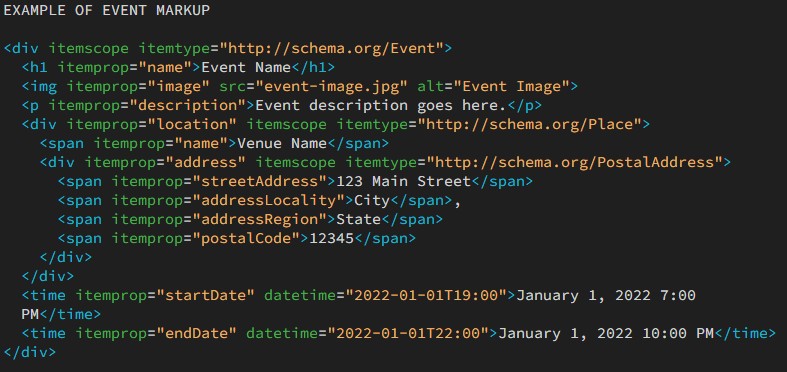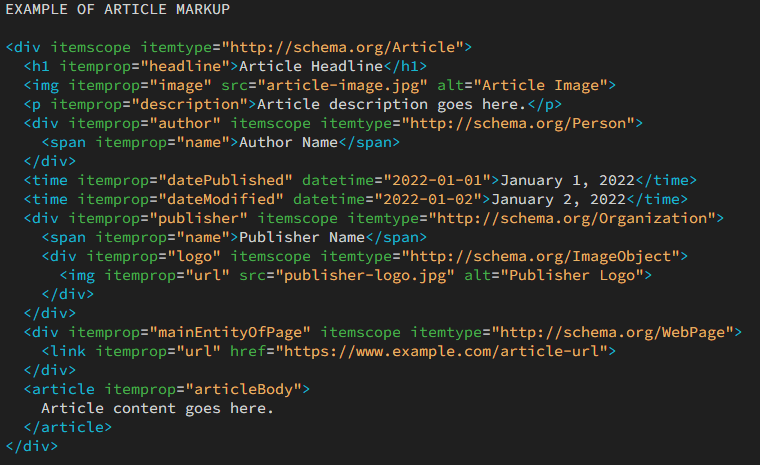
Discover how structured data and schema markup can boost your website's SEO performance. Learn the basics, types of markup, and common applications to maximise your search visibility.
Structured data involves the standardization of data organization and formatting, making it simpler for machines to interpret and comprehend. It is applicable to a wide range of information, including product listings, events, and recipes, among others. Microdata and JSON-LD (JavaScript Object Notation for Linked Data) are two prevalent implementations for structured data. Microdata requires the addition of specific elements to a webpage’s HTML code, whereas JSON-LD requires the addition of a structured data block in the form of a JavaScript object to the page’s head or body.
Schema markup is a specialized form of structured data that uses a standard vocabulary to characterize the context and content of a website. The collaborative initiative Schema.org, led by major search engines such as Google, Bing, and Yahoo, seeks to establish a standard set of schemas for describing various entities and concepts on the web. Incorporating schema encoding can increase a webpage’s visibility in search engine results, especially for niche or specific queries. In addition, structured data and schema encoding can improve the search experience for users. Adding product markup to an e-commerce website, for instance, enables search engines to display complex snippets in search results, which could increase the website’s click-through rate. Although structured data and schema markup are not direct ranking factors for search engines, they can indirectly influence the visibility and efficacy of a website in search results. Consequently, they are essential for enterprises and organizations seeking to optimize their websites for search engines.
By assisting search engines in comprehending a website’s content and context, structured data and schema markup can boost a website’s visibility and efficacy in search engine results. The ability to enhance search features and rich snippets is a primary advantage of structured data and schema markup. Rich snippets are additional elements of data displayed in search engine results, such as product ratings, event dates, and cooking times for recipes. Structured data and schema encoding enable search engines to recognize and display this additional information, thereby enhancing the website’s visibility and click-through rate in search results.
The expanding use of voice assistants and their effect on SEO is a further factor to consider. Voice search is becoming more prevalent as devices like Amazon Echo and Google Home grow in popularity. By providing additional context and meaning to a website’s content, structured data and schema encoding can increase its visibility in voice search results. Structured data and schema encoding can enhance the user experience in addition to boosting a website’s visibility in search engine results. Implementing recipe markup on a food and cooking website, for instance, enables search engines to display recipe rich snippets in search results, thereby making it simpler for users to locate the desired information.
While incorporating structured data and schema markup does not guarantee enhanced search performance, it can be a significant factor in assisting search engines in comprehending the content and context of a website and delivering a better user experience. Consequently, it is a crucial factor for businesses and organizations seeking to optimize their websites for search engines and improve technical SEO. It is essential to remember that structured data and schema markup are only one aspect of search engine optimization, and that many other factors can affect a website’s visibility and efficacy in search results. However, structured data and schema encoding can be a valuable asset for businesses and organizations seeking to improve their search engine optimization efforts.
Structured data and schema markup are essential for improving the visibility and efficacy of websites in search engine results. Listed below are some common applications of structured data and schema markup that can aid in search engine optimization.
Using Product schema notation to provide detailed information about products, such as prices, availability, and customer ratings, can be extremely beneficial for e-commerce website development. This enables search engines to display rich snippets in search results, providing users with a more thorough comprehension of the products and possibly increasing click-through rates.

Event Schema Markup is a useful utility for websites that promote events, concerts, conferences, and workshops. By providing essential information about events, such as dates, locations, and ticket availability, search engines can display rich excerpts in search results, providing users with more in-depth information about the event and potentially increasing its visibility and click-through rate.

Recipe schema markup enables websites that feature recipes to provide detailed information about ingredients, cooking periods, and serving sizes. This allows search engines to display complex snippets in search results, providing users with more comprehensive information about the recipe and potentially increasing click-through rates.
Local businesses seeking to optimize their websites for local SEO can use Local Business schema encoding to provide essential business information, such as location, business hours, and contact information. This enables search engines to display complex snippets in search results, providing users with additional details about the business and potentially increasing visibility and click-through rates.
Article schema markup is useful for news and publishing websites because it provides essential information about articles, such as the author and publication date. This assists search engines in displaying rich excerpts in search results, providing users with more detailed information about the article, improves on-page SEO and increases click-through rates.

Job Posting schema markup is advantageous for websites that feature job listings, as it provides essential information about job vacancies, including job title, employer, location, and salary. This enables search engines to display complex snippets in search results, providing users with additional details about the job opening and potentially increasing visibility and click-through rates.
Video Object schema markup can be used by websites with video or multimedia content to provide essential information about the content, such as video duration, upload date, and thumbnail images. This enables search engines to display complex snippets in search results, providing users with additional information about the video content and potentially increasing click-through rates.
Review schema markup is beneficial for websites that include reviews and evaluations for products, services, and local businesses. By providing detailed information about reviews and evaluations, search engines are able to display rich snippets in search results, providing users with more comprehensive information and potentially increasing click-through rates.
Implementing structured data and schema markup on your website is a powerful way to enhance your SEO efforts and improve your search engine visibility. By providing search engines with essential context and information about your website’s content, you can create a more engaging and user-friendly experience for your visitors. The various types of markup available cater to a wide range of industries and purposes, ensuring that you can find the perfect fit for your website’s unique needs. While it’s important to remember that structured data and schema markup are just one aspect of a comprehensive SEO strategy, they can play a significant role in boosting your website’s search performance. By understanding and applying these techniques, digital marketing professionals can stay ahead of the curve and maximize their online presence.
Get in touch with a brief summary of your requirement and we’ll be happy to discuss your project in an open and transparent manner.
Request a Consultation
March 2024 brought significant news with a wide-scale culling of poor quality, spammy websites, many of which heavily relied on AI-generated content...
Read More
As the European Accessibility Act (EAA) 2025 approaches, organisations must proactively enhance their digital accessibility. This guide outlines criti..
Read More
This article delves into the rapidly evolving world of voice search technology and its potential impact on the advertising industry. It highlights the..
Read MoreNavigate the complex world of cybersecurity, and learn how to protect your digital assets, ensure customer trust, and uphold your brand's reputation a..
Read More
March 2024 brought significant news with a wide-scale culling of poor quality, spammy websites, many of which heavily relied on AI-generated content...
Read More
Our strategic mindset, client-focussed approach, reliability, flexibility and high-degree of digital expertise ensures you are in safe (and transparent) hands. Learn more about our team.
More About Us